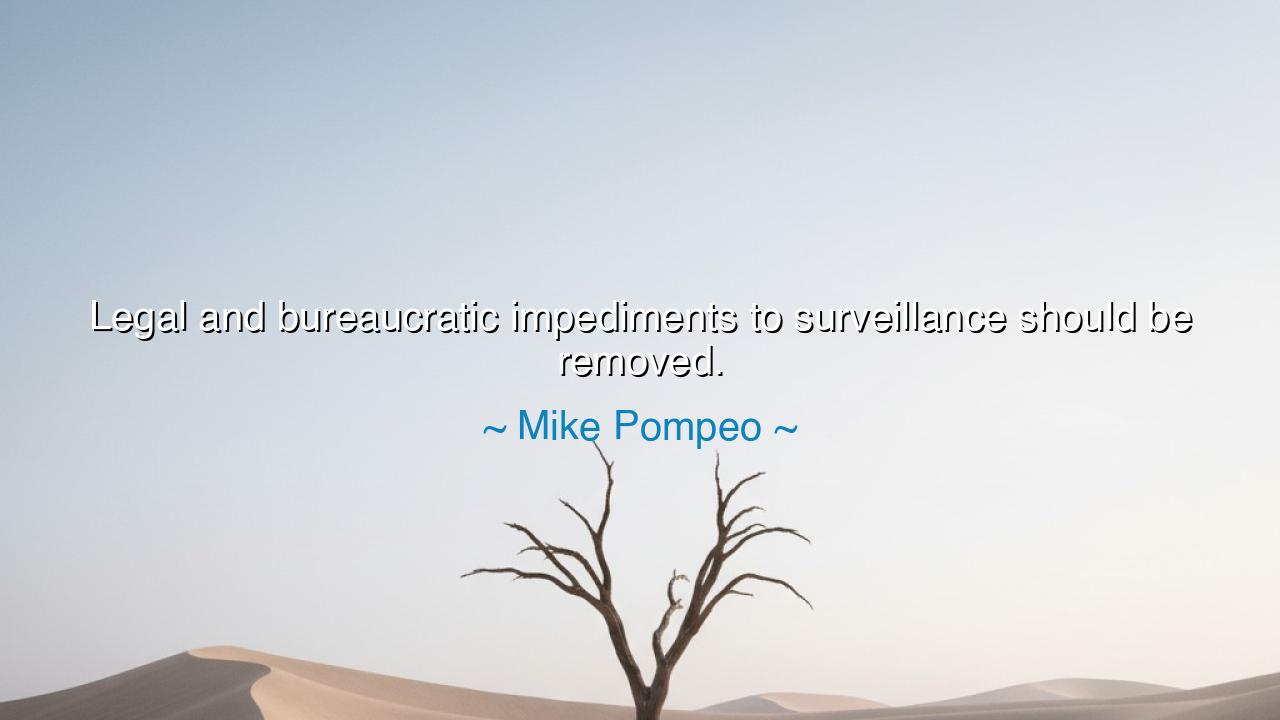
Legal and bureaucratic impediments to surveillance should be






Hear the stern words of Mike Pompeo: “Legal and bureaucratic impediments to surveillance should be removed.” In this saying lies the voice of authority, calling for swiftness of action and the tearing away of obstacles that hinder the eyes of the state. Yet it is also a phrase heavy with danger, for it touches upon the eternal tension between security and freedom, between the power of rulers to watch and the rights of the people to live unobserved. It is a reminder that in every age, leaders have sought greater reach into the lives of their citizens, justifying it in the name of safety, unity, or strength.
The meaning of this quote lies in the call for efficiency above restraint. To remove impediments is to strip away the slow workings of law and administration, those checks and balances crafted to guard against abuse. To favor surveillance unshackled is to place trust in the watchers, believing their eyes will be used only for the good of the people. Yet history warns us that unchecked power, however noble in intent, can become a shadow over freedom. The wisdom of the ancients cries: beware the eye that sees all, for it may forget its limits.
Consider the story of Rome. In times of war, the Senate would appoint a dictator, granting him sweeping powers for six months, so that bureaucratic impediments would not hinder the survival of the republic. Sometimes, these powers were used wisely, and Rome was preserved. But in the end, men such as Sulla and Caesar clung to extraordinary power beyond their term, and the republic fell to empire. The lesson is clear: temporary surveillance, freed from law, may defend a people in crisis, but if not bound by limits, it will grow into chains.
Likewise, in the modern age, the world witnessed the rise of East Germany’s Stasi, one of the most infamous surveillance states in history. What began as a mission to protect the people from enemies of the state turned into a vast web of spies, informants, and secret files. Neighbors betrayed neighbors, families lived in fear, and freedom was strangled beneath the gaze of an all-seeing state. Here we see the danger of removing legal and bureaucratic impediments without caution: the balance tips from protection into oppression.
Yet Pompeo’s words also reflect a truth born of real peril. In times of terrorism, espionage, and hidden threats, a state burdened by endless procedures may fail to act swiftly enough. Lives may be lost because the watchers were bound by red tape. The ancient Chinese strategist Sun Tzu declared that information is the lifeblood of victory, and that a wise ruler employs spies as one of his greatest tools. In this light, surveillance becomes not an enemy, but a shield, and the call to remove obstacles is a call to sharpen that shield before the blow falls.
The lesson for us, then, is not to embrace Pompeo’s words blindly, nor to reject them outright, but to seek balance. The law is a fortress that guards against tyranny, but it must not be so rigid that it leaves the people defenseless. Likewise, surveillance can protect against threats, but it must not be so unbound that it devours the very freedoms it was meant to defend. True wisdom lies in crafting systems that are strong yet restrained, swift yet just.
Practically, this means citizens must remain vigilant. Do not despise surveillance altogether, but demand transparency, accountability, and limits. Support leaders who recognize both the necessity of security and the sanctity of liberty. Refuse to surrender freedoms without question, but do not ignore the dangers that stalk unseen. Each generation must walk this narrow path anew, balancing the shield of protection with the torch of freedom.
Thus, let Pompeo’s words be heard as a challenge: if legal impediments are to be removed, let it be only with greater wisdom, lest the removal of chains from the state becomes the placing of chains upon the people. For the watchers must always be watched, and the guardians must always be guarded—lest the hand that protects becomes the hand that oppresses.






AAdministratorAdministrator
Welcome, honored guests. Please leave a comment, we will respond soon